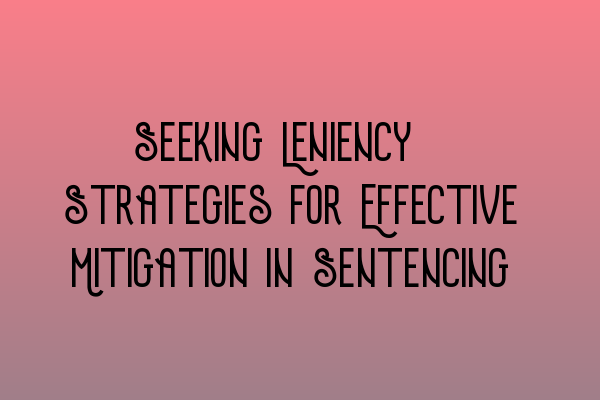Seeking Leniency: Strategies for Effective Mitigation in Sentencing
When faced with criminal charges, seeking leniency during sentencing can have a significant impact on the outcome of your case. Mitigation plays a crucial role in convincing the court to consider alternative options to lengthy prison sentences. In this article, we will explore effective strategies for securing leniency in sentencing and ensuring a fair resolution to your case.
Understanding Mitigation
Before diving into the strategies, it is essential to have a clear understanding of what mitigation entails. Mitigation refers to the process of presenting evidence or arguments to the court that may justify a lesser sentence. This can include factors such as:
- Evidence of remorse
- Personal circumstances
- Contributions to society
- Rehabilitation efforts
By effectively presenting these factors, you can persuade the court to consider a more lenient sentence.
Strategies for Effective Mitigation
1. Expressing genuine remorse: One of the most powerful tools for securing leniency is to demonstrate genuine remorse for your actions. Expressing regret and understanding the impact of your behavior can resonate with the court and show your willingness to change.
2. Highlighting personal circumstances: Providing insight into your personal circumstances can help the court understand the context of your actions. This includes factors such as financial difficulties, mental health issues, or a history of abuse. It is important to present these circumstances in a way that humanizes you and demonstrates your potential for rehabilitation.
3. Demonstrating contributions to society: Showing the court your positive contributions to society can help portray you as a valuable member despite the charges you face. This can include volunteer work, community involvement, or employment history.
4. Highlighting rehabilitation efforts: If you have taken steps towards rehabilitation, such as seeking counseling or participating in support programs, make sure to emphasize these efforts. Providing evidence of your commitment to change can significantly influence the court’s perception of your case.
Why Effective Mitigation Matters
Engaging in effective mitigation strategies can make a crucial difference in the outcome of your case. By presenting a compelling argument for leniency, the court may be more inclined to consider alternatives to imprisonment, such as probation, community service, or rehabilitation programs. This can lead to a fairer and more rehabilitative resolution to your case.
Conclusion
When facing criminal charges, seeking leniency through effective mitigation strategies should be a priority. By expressing genuine remorse, highlighting personal circumstances, demonstrating contributions to society, and emphasizing rehabilitation efforts, you can significantly increase your chances of receiving a more favorable sentence. Remember, each case is unique, so it is crucial to consult with a qualified solicitor to develop a personalized mitigation strategy tailored to your circumstances.
